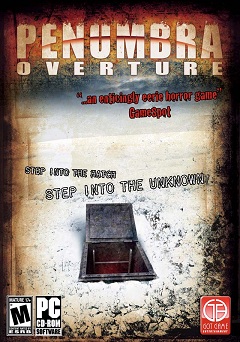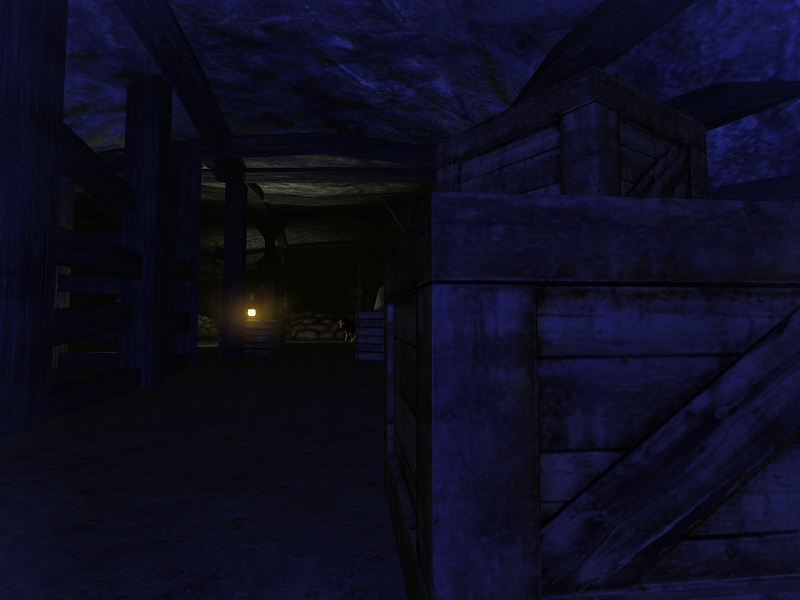Penumbra: Overture
| Penumbra: Overture | |
|---|---|
 |
|
| Platforms | Windows, OSX, Linux |
| Genre | Physics-based Survival-Horror Adventuring |
| Score | 7  |
Atmosphere. Danger. Environment. Expectation. These words are integral to any sort of horror-based media, and yet many have seemingly forgotten all about the reasons behind fear and instead rely on cheap tactics to do the job. Penumbra: Overture shows a much more sophisticated ability to keep players on edge without relying on grotesque visuals and cheap 'jump moments' to elicit responses. I was particularly curious as to how this game could effect me since I'm not easily frightened and cheap attempts at fear usually seem more humorous than scary. And overall, the game does a fairly good job at its goals. Let me explain.
Overture almost takes advantage of those modern media shortcuts to create a fully engrossing experience with the capability to be legitimately frightening. As a response to these movies, shows, and games, your mind now expects something to happen when you travel down a dark hallway, into a new room, or when encountering an enemy. Instead, nothing typically happens in Penumbra. In fact, very little "happens" throughout the whole game. Almost all of the happenings and story events involve Phillip sorting out the past of his forgotten surroundings instead of building the story himself or primarily creating a story. At heart, Overture is a first-person adventure game, with the atmosphere as really the only major demarker to the survival-horror tag. I can recall only a handful of actual "events" Phillip was directly involved in. And yet this feels perfectly fine in the context of the game.
Overture does such a good job creating expectations that the actual events have a much greater impact that otherwise possible. It doesn't need to constantly throw monsters at you. It doesn't need to mysteriously close or open doors around you. It gives the player more credit than that and lets the player determine the level of danger with much more subtle cues. It also lets the player relax and feel safe at times they should be able to feel safe. If someone is on maximum edge all the time, their overall experience is massively diminished as they aren't able to compare stress levels and it all feels the same to them. This acclimation concept can prove analog to almost any aspects of life, from say, music (the loudness war) to drug tolerance. The fact of the matter is that Frictional Games goes about creating fear and stress in a very smart and effective way.
As mentioned earlier, the story mostly builds around the character rather than them shaping it. An existing world already exists, and it's the curious player's job to discover it. For the most part, the game is linear but it also includes many journal notes which are generally optional but do a very solid job in supplementing the backstory, which is layered for many years while building up to the present. By the end, the player starts to learn some truths of this harrowing encampment but still not yet nearly enough to turn away. Overture ends in a splendid cliffhanger which leads directly into the second episode (Black Plague), as well as making it almost impossible for players to stop there. (Aside: Overture and Black Plague were intended from the start as the full main story and the third Penumbra, Requiem, seems to be more of a discontinuation or 'alternate universe').
The depths of the atmosphere and story are supplemented by adequate visuals and sound design. Although Overture released in 2007, the technical design is more similar to (and even seemingly more basic than) Doom 3 and Half-Life 2. While this is not necessarily a bad thing, as Frictional is a tiny team and this allows play on more systems, the experience would likely have been a bit more impactful with more technical power behind it. However, the sound design is especially nice given the limited resources available to the team at the time.
Unfortunately, largely due to control issues, the gameplay can feel a bit overly frustrating at times. The mouse look is smooth and solid, like one would expect in a PC fps. However, the physics-based object control somewhat misses the mark. Carrying and placing objects works fine most of the game, but events such as turning wheels or precisely stacking/laying objects proved quite frustrating and cumbersome. Weapon control created similar frustrations. As Penumbra creates a very dangerous world for the player, we are not given traditional powerful fps weaponry and instead need to rely on more realistic tools such as hammers and pickaxes. Weapons are further embued with realism by only allowing movement-based attacking controls. To swing a weapon, you have to hold mouse1 and then swing either left>right, right>left or perform a stabbing motion with down>up (think of something you'd do on the Wii). While practice and repetition helps a bit, it still never feels solid by the end and could have easily used some extra testing and tweaking. Games can certainly become quite frustrating if a player gets caught in a fight they didn't want and then lose due to control issues. I've read that Black Plague removes fighting almost entirely due to player concerns and complaints about the system in the original, and I feel like this was probably a good decision if they couldn't negate the problem.
In summary, Penumbra: Overture is a fantastic horror game as well as an excellent initial release from Frictional Games. Overture absolutely nails the horror aspects and while the rest of the game is a bit hit-or-miss, I come out with a very solid impression and look forward to their other (and future) releases. Playing Black Plague is almost a foregone conclusion after playing Overture. Fans of horror, or even people interested in the concept, would serve themselves well to give Penumbra a look, and seeing as it's available on PC, OSX and Linux, few people have excuses not to.
For media of Penumbra: Overture, feel free to check out our Audio-Visual Experience (note: contains spoilers). For first hour gameplay, visit its first hour review.

